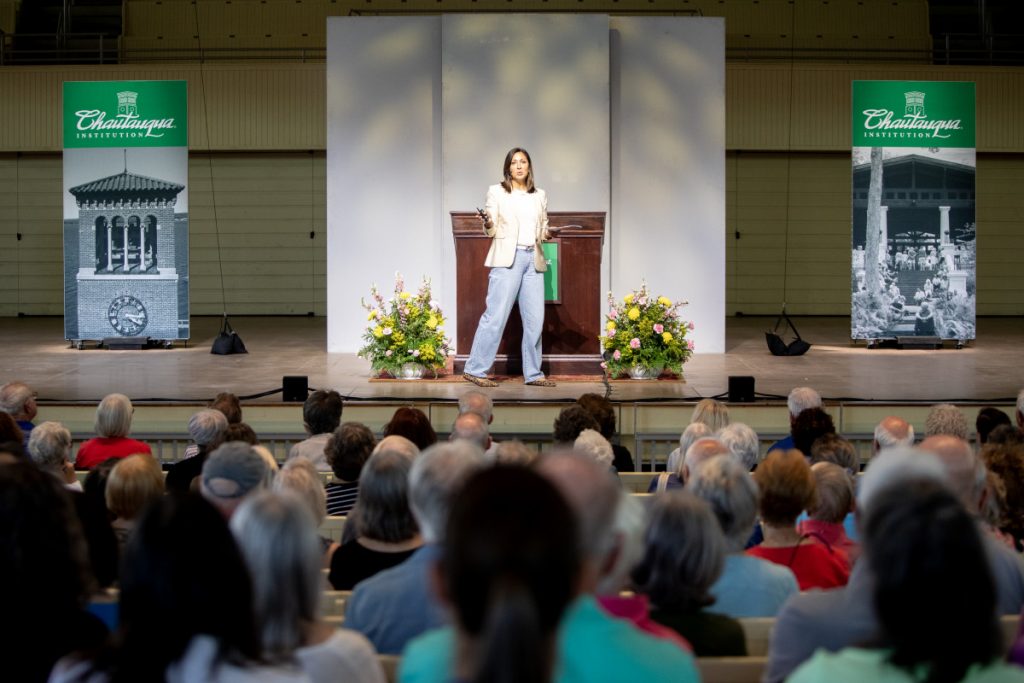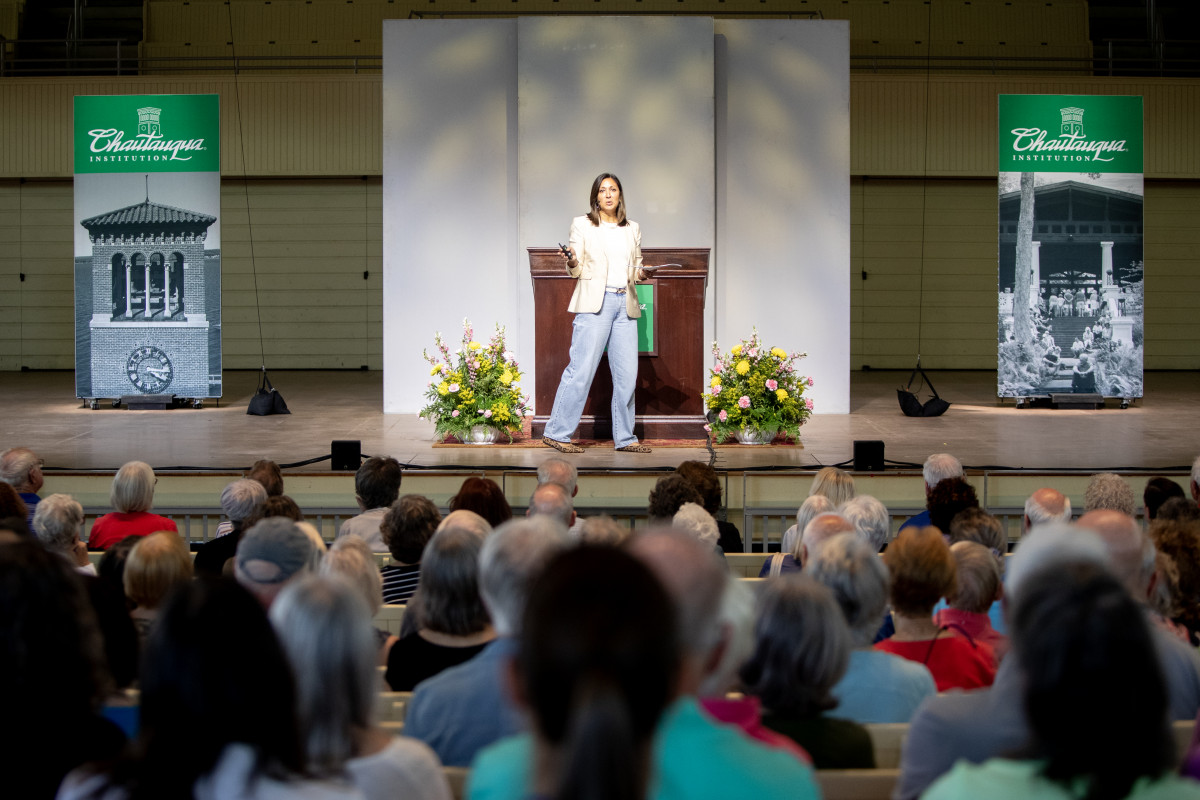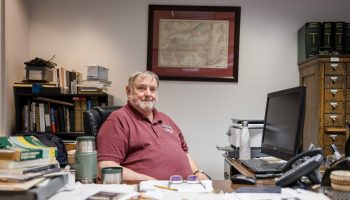
Amna Nawaz, co-anchor of PBS New Hour, said that when she was first invited to speak as part of the Week Seven Chautauqua Lecture Series theme “Kwame Alexander and Friends: The Power of One,” she struggled to find where she fit into the theme because, so often, she is reporting on atrocities and disasters that showcase the worst of humanity.
“I’m a journalist,” she said at the 10:45 a.m. Thursday lecture in the Amphitheater. “I regularly use words like ‘death’ and ‘destruction’ in my everyday life. No one says, ‘I’m not feeling so great — I think I’m going to turn on the News Hour and see what Amna has to say to feel a little bit better.’ And that’s OK.”
She said she thought back to the last time she spoke with Alexander for the News Hour, for the release of his poetry collection This is the Honey, and their discussion about how art can heal societal woes.
“It was this idea that even in the darkest of places, there’s always some kind of light,” she said. “That what this world needs more of is not naysayers and cynics and people telling you how dark it is — it needs people who show up and light a torch and help to lead the way out.”
Nawaz shared an excerpt of a poem by Nikita Gill that she related to her experiences finding hope in even the darkest of times.
“Even in my work in the darkest of times, the worst of humanity, I see people every day in every story who show up with strength and love and resilience and hope and lead everyone out, people who care,” Nawaz said.
She talked about her family — her grandmothers, “the women that I come from,” who made “new homes in new lands and built lives out of love and hope and resilience” — and her father, who loved the writings of philosopher Bertrand Russell. Nawaz had a “normal childhood,” filled with Barbies, She-Ra and Nintendo.
“I’ve found that over the years, it doesn’t really matter where you are or when you were raised, that same hope, that same resilience, it courses through all of us to different degrees and in different ways,” she said. “Sometimes, it’s born out of sheer necessity, sometimes it’s born out of survival … I see the very worst a lot. But I also see the very best every single day. These are people who stay with you in ways that you never anticipated because of the way that they lead their lives, who remind you that the world can be this better version of itself if you want it more.”
During her lecture, Nawaz spoke about three stories she reported on that have stayed with her as narratives of hope, strength and resiliency throughout her career of more than 20 years in journalism.
The first story Nawaz shared was one about Pashtana Durrani, an Afghan activist and educator who was only 23 years old at the time when Nawaz reported on her in 2021. When Taliban forces captured Kabul, the capital of Afghanistan, in 2021, Durrani spoke out for women and girls who lost access to education.
“What she had to say at the time was also uncannily prescient,” Nawaz said. “She talked about how worried she was that girls wouldn’t be allowed to go to school anymore, how worried she was that public spaces for women were going to continue to shrink, how worried she was that the rest of the world was going to move on. The headlines would fade, and we would stop paying attention to what was going on there.”
What Durrani said at the very end of the interview has stuck with Nawaz.
“When I said, ‘You’re 23. You have your whole life ahead of you; you could try to leave, do something else. You don’t have to do this work anymore,’ and she said, ‘Why wouldn’t I? If I don’t do it, who will? This is my country, it’s my responsibility. Of course I’m going to do this,’ ” Nawaz said.
Nawaz explained that in the several weeks that followed, she along with many others worked to bring Durrani to the United States in hopes of keeping her safe, so she could continue to advocate for others. Now, said Nawaz, Durrani has not only completed her undergraduate degree but has gone onto her master’s degree and works at Wellesley College while continuing her work educating young women in Afghanistan.
“This is a woman who continues to build the next generation of leaders even from afar because she refuses to believe that today defines their future. She does this work with hope and with resilience and with love,” Nawaz said.
Nawaz referenced another poem titled “Instructions on Not Giving Up” by Ada Limón, which she said she thinks of when she talks with Durrani.
The next story Nawaz shared was one of three young sisters who had crossed the border together to meet their mother, who had been living in the United States for over seven years at the time and was working to save money to support them and bring them to the country.
She shared the poem “Home” by Warsan Shire, which she connected to immigration because “no one leaves home unless / home is the mouth of a shark.”
“They told me that they didn’t know anyone along the way,” Nawaz said. “They didn’t have anyone along the way, but they had each other.”
The middle child carried her mother’s phone number with her, and Nawaz called the mother to assure her that her children had made it across the border. She said she remembered the relief in the mother’s voice as they spoke to each other and said they would see her soon.
“When I asked her why she chose to send them this way, she said, ‘I have no choice. They stay at home, and they die, or they die trying to make it to me, and it was worth them trying to make it to me,’ ” Nawaz said.
When Nawaz left, she thought the girls would be taken into the custody of U.S. Border Patrol, but she said late that night, their mother called, telling her the children had been left behind when a physical fight broke out when there wasn’t enough room for everyone in the van.
At night, Nawaz said, temperatures fall drastically and cartel members seek out the vulnerable, posing incredible danger to the girls.
“There are moments in this job when you have to step away from what it is that you need to do for your work and do what you need to do as a human being,” she said.
She and her team called the local police, fire department and border patrol station and brought them photos of the girls, asking them to rescue them and bring them to protection. After an overnight rescue mission, the girls were found and, days later, reunited with their mother.
Nawaz said that while it is unsatisfying not to know the outcome of these stories — where the girls are now, where their mother is, if they’ve been affected by the recent waves of legislation targeting immigrants and asylum-seekers — the story resonated with her because of the resilience the children held.
“There was this idea that it didn’t matter what the next step was, they were going to keep moving forward until they found safe ground,” Nawaz said.
For her, the hope she sees is often “not hope with a happy ending” but, instead, “defiant hope.”
“It’s the difference between standing still and just accepting the world as it is, and actually moving forward in spite of it all, in sheer defiance of what the world presents you with,” she said.
Nawaz said that sometimes the world presents an event that is so horrific, it can be very difficult to find hope in it. For her, one of the toughest stories she covered was the mass shooting in Uvalde, Texas, at Robb Elementary School where 19 children and two teachers were killed.
The students were around the same age as her eldest daughter at the time. The more Nawaz and her team reported on the story, she said, the more they unearthed how badly the adults had failed the children over and over.
“I really struggled. I struggled to find the words,” Nawaz said. “I struggled to make sense of it all, which is my job. Because the truth is, it makes no sense at all. It never should have happened.”
Nawaz told the story of Javier Cazares, whose daughter, Jacklyn, was killed at Robb Elementary; Cazares agreed to speak with Nawaz about his daughter a year after the shooting took place.
“Something shifted in me after reporting this story that never quite shifted back,” Nawaz said. “There are holes in these families, in this community that are never going to be filled, so where is the hope in a community like this? Where is the hope in a story like this?”
A year after the shooting, the families and community remembered and honored each of the victims and shared their stories far and wide.
“Everyone — their mothers, their fathers, their sisters, brothers, neighbors, friends — they’d wake up every single day and remember these children and speak their names because you know if someone is still saying your name you are never, ever forgotten,” Nawaz said.
“They all know that the work that needs to be done to make sure this doesn’t happen to any other community is ongoing, and they are now fully a part of it, and there is hope in that. There is hope in their choice every single day to wake up and remember. There’s resilience in the remembering. It’s this idea that I can be changed by what happens to me, but I refuse to be reduced by it,” Nawaz said, referencing Maya Angelou’s Letter to My Daughter.
To conclude her lecture, Nawaz spoke about the role of journalism in fostering hope, resiliency and strength by telling stories about life in all its forms.
“We tell stories about lives in danger, lives protected by privilege, lives in power, lives on the move. We cover it all; we cover it all with fidelity to the facts, without fear or favor, and we are covering it now, even as we’re struggling to keep hope about our own industry and our own futures,” she said.
Nawaz acknowledged the recent budget cuts that have affected public media, including NPR and PBS, and referenced a 1961 speech made by former Federal Communications Commission chairman Newton Minow in which he called for public television that could meet public interests.
“Look, these are times of incredible uncertainty and fear for a lot of people,” Nawaz said. “I know that. I say, this time, as much as any other time in our history, this is also a time of great hope.”
She pointed to the individuals in each of the three stories from her lecture as being exemplary of hope amid some of the most horrific events in recent history.
“It is hope I see every single day in the entire team I work with at the News Hour — people who show up every day, dedicated to the work because they know it needs to be done,” she said.
Nawaz played a clip of the message she and her News Hour co-anchor Geoff Bennett signed off with after learning their funding had been cut. Their message to viewers ended in these words: “Your belief helps sustain our work and your loyalty, especially now, fuels it. And we are profoundly grateful. And we will continue our work as journalists without fear or favor.”
The Amp audience applauded.
“These are the days we’re all going to look back on, and we’re going to think, ‘Did we do enough? Did we say enough? Did we use our voices in the way that they needed to be used? Did we do what we could to bring hope to others? Did we carry it forward ourselves? Did we stare down those darkened paths and marvel at how dark it was, or did we light a torch and help to lead the way out?’ ” Nawaz asked.
“I’ve seen every single day where that kind of hope and resilience comes from,” she said. “I know it comes from within, from within each and every single one of us. So, if all of you believe, as I do, that it is only during the darkest of night that all the stars shine brightest, it is time to show up, and it is time to shine bright. If not now, then when, and if not you and me and all of us, then who?”





